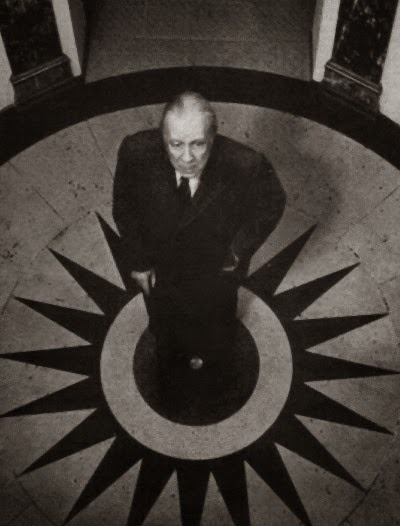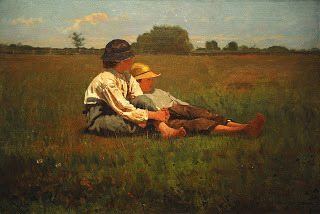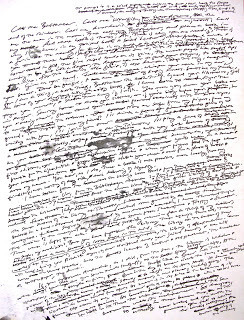Keith Miller's Blog, page 4
April 22, 2014
"The Missing Borges"

Marvelously convoluted and Borgesian tale of a stolen Borges first edition, the Argentinian National Library, and a possibly shady bookseller, up at the Paris Review :
"Casares, now suspected of having taken part in the very crime whose investigation he had initiated, testified before the judge that the book was not the same one that had been stolen from the Library—nor, however, was it the facsimile he’d sold to Pastore. It was, he explained, a third book, similar to the others."
Published on April 22, 2014 16:05
April 15, 2014
The Death of Araweilo

Excellent poem by my wife up at Tor:
"Araweilo the queen is dead wicked queen Araweilo.
Sing she is dead.
Rejoice she is dead cruel Araweilo the foe of men.
She is dead, the queen of impossible tasks who said: Men climb Mil-Milac or else you die, climb Mil-Milac the mountain of glass.
Araweilo laughed and her teeth were of glass like the mountain her manicured nails were of glass and the clasps of her slippers her cell phone her lipstick her car."
Read a bit about Araweilo here.
Published on April 15, 2014 06:46
April 7, 2014
The English Patient

I first read The English Patient in Atbara in northern Sudan, and the wonderful Lee Miller photo on the cover echoed the landscape. For a couple years I couldn't get enough of the book, rereading it every couple months. The sentences are so carefully wrought, the language always riskily fresh:
"We die containing a richness of lovers and tribes, tastes we have swallowed, bodies we have plunged into and swum up as if rivers of wisdom, characters we have climbed into as if trees, fears we have hidden in as if caves. I wish for all this to be marked on my body when I am dead. I believe in such cartography - to be marked by nature, not just to label ourselves on a map like the names of rich men and women on buildings. We are communal histories, communal books. We are not owned or monogamous in our taste or experience. All I desired was to walk upon such an earth that had no maps. I carried Katharine Clifton into the desert, where there is the communal book of moonlight. We were among the rumor of wells. In the palace of winds."
Though the characterization is at times awkward - a by-product of Ondaatje's risk-taking - one falls achingly in love with the characters.
Ondaatje writes piecemeal, crafting scenes, honing characters, and then hoping for a narrative. He has said that the first section he wrote was Caravaggio's theft of the camera in the hotel. The English patient's voice arrived with the word "aerodrome."
Count Ladislaus de Almásy, Ralph Bagnold, Hassanein Bey, and certain others mentioned in the book were genuine desert explorers. The real Almásy was, however, gay.
Though the setting is exotic, some of the Katharine/Geoffrey Clifton/Ladislaus de Almásy triangle may be related to Ondaatje's theft of Kim Ondaatje (thin, blonde, artsy) from her professor husband in Ontario.
(An extended aside: Ondaatje's books echo each other, so rereading them is a curiously deep and wide experience. Anna in Divisadero says: "We live permanently in the recurrence of our own stories." Here are some echoes.
Names in The English Patient: Hana, Clara, Kip. Names in Divisadero: Anna, Claire, Coop. Anna and Hana also chimes with Anil from Anil's Ghost.
Kip is a Sikh, a group that has a "mystical affinity for machines." Coop prefers metal to wood: "all those varieties and modes of metal life." Kip is a sapper, dismantling bombs. Coop "loved risk and could be passive around danger."
When Coop loses his memory after being tortured, Claire pretends to be Anna. Anil buys her brother's name for "one hundred saved rupees, a pen set he had been eyeing for some time, a tin of fifty Gold Leaf cigarettes she had found, and a sexual favor." In Divisadero, Roman and Marie-Neige pretend to be brother and sister. "A family keeps its secrets," notes Anna.
Coop is tortured in Divisadero. Caravaggio is tortured in The English Patient.
Both Caravaggio and Rafael's thief father find their wives during or in the aftermath of robberies.
In The English Patient, Kip subsists on raw vegetables and herbs. In Divisadero, Rafael always seems to have raw herbs about him.
In Divisadero, Anna brings soap with her "from another world." In Running in the Family, a boar steals Ondaatje's Pear's transparent soap, which he has carried through the filthy hotels of Africa.
Kip and Coop both refuse drugs.
Caravaggio and Rafael are both named for Italian painters.
In Coming Through Slaughter, Buddy Bolden smacks and shatters a window pane. In Divisadero, Anna shoves a triangle of glass into her father's shoulder. Later in Divisadero, Lucien receives a splinter of glass in his eye.)
The themes of The English Patient include identity, religions, encounters across cultures, and youth/age. At one point the English patient says:
"There's a painting by Caravaggio, done late in his life. David with the Head of Goliath. In it, the young warrior holds at the end of his outstretched arm the head of Goliath, ravaged and old. But that is not the true sadness in the picture. It is assumed that the face of David is a portrait of the youthful Caravaggio and the head of Goliath is a portrait of him as an older man, how he looked when he did the painting. Youth judging age at the end of its outstretched hand. The judging of ones's own mortality. I think when I see him at the foot of my bed that Kip is my David." [image error]

But the thief Caravaggio is of course also a portrait of Ondaatje, and one could surmise that the older Ondaatje is judging the young self who committed the infidelities with an older woman.
The English Patient gathers many other works into its pages: Anna Karenina, Kim (echoing his first wife's name, and also chiming with Kip), Herodotus's Histories, A Midsummer Night's Dream ("Sometime a fire" is from a speech by Puck), Paradise Lost, and jazz lyrics, among others.
The book does not entirely work. The final sections, in which Kip, an Indian Sikh, hears of the atomic bombs on Hiroshima and Nagasaki and imagines "all Asia on fire," then threatens the English patient and drives off in a rage, are silly. As is "meet me at the moondial." Overall, Kip is the least convincing character. His actions lack coherence. However, the scenes in which he watches the Virgin come across the water, and his hours in deserted Naples are lovely.
Ondaatje's earlier books are wonderful. In the Skin of the Lion and Running in the Family have the same romantic, piecemeal, slightly insane quality I love in The English Patient. Unfortunately, as so often seems to be the case, the success of The English Patient appears to have had a negative effect on Ondaatje's writing. Anil's Ghost feels forced and thin, Divisadero doesn't work structurally, and The Cat's Table is too light.
Published on April 07, 2014 16:22
March 1, 2014
Olondria and "Selkie Stories" Up for Nebulas

My wife's novel A Stranger in Olondria and short story "Selkie Stories Are for Losers" are up for Nebulas. Fingers crossed!
Published on March 01, 2014 06:56
January 26, 2014
Olondria Wins the Crawford!

My wife's novel, A Stranger in Olondria , has won the Crawford Award for best first fantasy novel! She's in great company: past winners include Charles de Lint, Jonathan Lethem, K. J. Bishop, Christopher Barzak, and Jasper Fforde.
Published on January 26, 2014 08:33
December 18, 2013
A Stranger in Olondria in the Guardian!

My wife's novel A Stranger in Olondria has been selected by the Guardian as one of the year's best (together with Margaret Atwood, Jeff VanderMeer, Stephen King, and others). I think it would make a nice Christmas present.
Published on December 18, 2013 05:49
August 31, 2013
Making Strange

Seamus Heaney has died. Here's one of my favorite of his poems:
Making Strange
I stood between them,
the one with his traveled intelligence
and tawny containment,
his speech like the twang of a bowstring,
and another, unshorn and bewildered
in the tubs of his Wellingtons,
smiling at me for help,
faced with this stranger I’d brought him.
Then a cunning middle voice
came out of the field across the road
saying, ‘Be adept and be dialect,
tell of this wind coming past the zinc hut,
call me sweetbriar after the rain
or snowberries cooled in the fog.
But love the cut of this traveled one
and call me also the cornfield of Boaz.
Go beyond what’s reliable
in all that keeps pleading and pleading,
these eyes and puddles and stones,
and recollect how bold you were
when I visited you first
with departures you cannot go back on.’
A chaffinch flicked from an ash and next thing
I found myself driving the stranger
through my own country, adept
at dialect, reciting my pride
in all that I knew, that began to make strange
at the same recitation.
Published on August 31, 2013 06:48
August 30, 2013
Tom Sawyer

Hemingway famously said that all American writing comes from Huckleberry Finn. But Huckleberry Finn comes from Tom Sawyer.
Published on August 30, 2013 16:56
July 25, 2013
"Furlough"
 I have a new story up at the Center for Mennonite Writing website. It's called "Furlough," and is not my usual fantasyish stuff. This one draws on my childhood growing up in Kenya.
I have a new story up at the Center for Mennonite Writing website. It's called "Furlough," and is not my usual fantasyish stuff. This one draws on my childhood growing up in Kenya.
Published on July 25, 2013 06:52
July 4, 2013
The Book on Fire in process

For some reason, I kept every scrap of paper I used while writing The Book on Fire. Before we left Egypt, I took a picture of the stack, then dumped it in the trash.
Here's the first page. As you can imagine, much of my time is spent trying to decipher my handwriting.

Published on July 04, 2013 04:18



